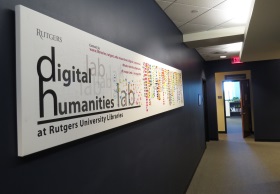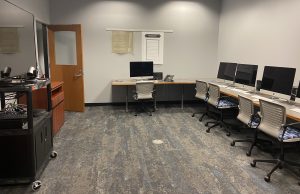 The Digital Humanities Initiative and the New Brunswick Libraries welcome students, faculty and staff to work collaboratively in the DH Lab (Alexander Library, Room 406-407). This space is available to members of the Rutgers community interested in interdisciplinary digital research methods and may be used for project work, consultations, research group meetings, small classes, and lectures
The Digital Humanities Initiative and the New Brunswick Libraries welcome students, faculty and staff to work collaboratively in the DH Lab (Alexander Library, Room 406-407). This space is available to members of the Rutgers community interested in interdisciplinary digital research methods and may be used for project work, consultations, research group meetings, small classes, and lectures
See available times as well as open lab hours on the Calendar. Email to request the space. Access the lab using your Rutgers ID card at the card reader. For more information on how to use the lab, please consult the DH Lab FAQ. If you’re a self-starter, consult our DH Lab Software Guide for a curated list of online tutorials on various applications and digital methods. To consult with one of the Libraries’ graduate research specialists, see the Graduate Specialist guide.
The DH Lab is equipped with five iMac workstations, flat screens for presentations and group work, Internet connection, floor outlets for plugging in, and the following software installed on the workstations.
|
Geospatial analysis:
|
QGIS
|
|
Text editing:
|
oXygen
|
|
Image editing:
|
ImageMagick, Adobe CS6 Production Premium, RTIBuilder, RTIViewer
|
|
Audio editing:
|
Audacity
|
|
Moving image editing:
|
iMovie
|
|
Network analysis:
|
Gephi
|
|
Content analysis:
|
NVivo
|
|
File management:
|
FileZilla
|
|
File storage:
|
Box
|
|
Object oriented programming:
|
Python, R, SPSS, STATA
|
|
Document processing:
|
LibreOffice, pandoc, LaTeX, Microsoft Office Suite
|
|
Command line utilities:
|
ImageMagick, wget, pandoc
|
|
IDE:
|
RStudio, Anaconda
|
|
Virtualization:
|
Parallels
|

